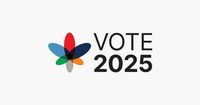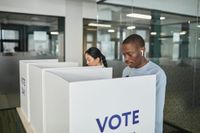The federal New Democratic Party has held strong in Edmonton Strathcona since 2008 and is likely to do so again in this 2025 election, according to aggregated polls. In the 2008 election, NDP’s Linda Duncan, in a narrow margin of victory, pushed out the Conservatives, and since then, the riding has stayed orange and was one of two NDP seats won in all of Alberta in the 2021 election. Incumbent Heather McPherson, who succeeded Duncan, has held the riding since 2019. She had one of the largest margins of victory in the 2021 federal election, sweeping up 60.3 percent of the votes.
Despite the NDP’s dip in popularity, with 338Canada projecting Edmonton Strathcona to be the sole “NDP likely” seat in Alberta this 2025 election, McPherson is confident the party will snap up even more seats than in the previous election. “I don’t really listen to those polls because every election I’ve ever been in, the polls say, ‘Oh, it’s dire,'” McPherson said. “I’ve been knocking on doors all across the province, and the support for the NDP in Edmonton and in Alberta is strong. I expect us to pick up seats. Obviously, I expect to hold Edmonton Strathcona and Edmonton Griesbach, but I expect that we will also take Edmonton Centre and potentially Manning.”
McPherson said this is a key election in determining the “future” of Canada. She stated that one of her priorities this election will be tackling the issue of affordability. She emphasized the need for rent control to protect residents from mass rent increases, which is something the NDP would look to establish.
On the other hand, Liberal candidate Ron Thiering previously represented the Liberals in the last two federal elections but was defeated both times. He highlighted the ongoing threat of tariffs and affordability issues as top concerns, asserting that the Liberals are the best positioned to navigate the developing crisis. Thiering noted a “strategic feel” among voters, suggesting that many people favor Liberal Leader Mark Carney but fear that a Conservative candidate may take the riding, prompting them to continue voting NDP. “I think that’s why the Liberals really want to make an impact in Alberta this time is because we want to make sure that Albertans feel a part of the process,” Thiering said.
Meanwhile, the People’s Party of Canada (PPC) candidate David Wojtowicz pointed to the dip in the NDP’s popularity as a potential gap to make their case to residents in Edmonton Strathcona. “I would say it would take quite a miracle to pull it off, but that’s the point of democracy, to give people options on the ballot,” Wojtowicz said. He mentioned that one of his party’s major priorities would be to put a temporary moratorium on immigration, which he believes is becoming an issue due to people struggling to find work and companies outsourcing jobs. “It’s just purely because it’s not logical to bring more people in when we have so many problems. We don’t have the infrastructure to support more immigration, especially at the mass level,” Wojtowicz added.
Conservative candidate Miles Berry previously ran as the UCP candidate for Edmonton-Gold Bar in Alberta’s 2023 provincial election. When Postmedia reached out to Berry for an interview at the beginning of April, his team stated, “With the short time before advance polls and election day, we just can’t make this work logistically.”
As the April 28 election date approaches, employers across Canada must also be aware of their obligations under the Canada Elections Act, which mandates that all employees who are Canadian citizens and 18 years of age or older are entitled to have three consecutive hours off work during voting hours to cast their ballots. Time off with pay must be provided, at the convenience of the employer, to the extent necessary to allow three consecutive hours for voting.
In Manitoba, polls are open from 8:30 a.m. to 8:30 p.m., while in Saskatchewan, Alberta, and those portions of British Columbia using Mountain Time, polls are open from 7:30 a.m. to 7:30 p.m. In the remainder of British Columbia, polls are open from 7 a.m. to 7 p.m. Employees are not entitled to additional time off if their regular work schedule already allows for three consecutive hours during the time that the polls are open. However, where an employee does not have three consecutive hours before or after work while the polls are open, the employer must allow the employee to have time away from work to vote.
Employers can decide when to allow the time off—for example, by allowing the employee to start later or leave early. For instance, if an employee works from 8:30 a.m. until 4:30 p.m., the employer has no obligation to provide time off since there are three consecutive hours after the end of the employee’s workday when the polls are open. Conversely, if an employee works from 9 a.m. until 5 p.m., the employer can either allow the employee to start at 10:30 a.m. or leave work a half hour early at 4:30 p.m. If neither option is appropriate, the employer must allow the employee to have off three consecutive hours between 9 a.m. and 5 p.m.
The Act prohibits an employer from deducting pay or imposing any penalty due to the employee’s absence during the allotted three hours. Therefore, no employer may pay employees less than the amount they would have earned on polling day if they had continued to work during the time allowed for voting, regardless of their pay structure.
It’s worth noting that for employers in the transportation industry, the obligation to provide sufficient time for voting does not apply under specific circumstances, such as if the employer is a company that transports goods or passengers by land, air, or water, and the employee is employed outside their polling division.
As Canadians prepare to head to the polls, it is crucial for employers to implement necessary schedule changes in advance of April 28, 2025, ensuring compliance with the Canada Elections Act. Employers are encouraged to consult a member of their labour and employment law team for more information about these obligations and how to navigate the upcoming election period effectively.







